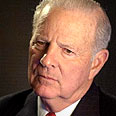
Baker accused of skirting US sanctions on Saddam
Businessman charges former US secretary of state used middleman to 'sell out' Israel for profit
The law firm at which former US Secretary of State James Baker is a senior partner used an Israeli middleman to bypass US sanctions on Iraq and push through a multimillion-dollar collection effort involving the regime of Saddam Hussein, according to an Israeli businessman who said he mediated the deal.
Nir Gouaz, president of Caesar Global Securities in Israel, told WND that Baker's firm, Houston-based Baker Botts, made about USD 30 million collecting funds owed to a South Korean company by the Iraqi government at the peak of American sanctions imposed against Baghdad.
He claimed Baker was directly involved in the deal.
Gouaz told WND he decided to come forward with details of the alleged transactions after the release earlier this month of a report by the Iraq Study Group, a commission headed by Baker that recommended an eventual US withdrawal from Iraq and dialogue with Iran and Syria.
The report also urged Israel to withdraw from the West Bank and eastern sections of Jerusalem, and to sign a deal with Syria in which the Jewish state would vacate the Golan Heights, strategic mountainous territory twice used by Damascus to launch ground invasions into Israel.
"As a citizen of Israel I cannot just sit by and watch the hypocrisy being spewed by Baker," said Gouaz. "If Baker was still a private citizen I could keep his business dealings private, but now he is involved in diplomacy that sells out Israel. People need to understand he is acting out of economic considerations."
Gouaz provided WND with documentation indicating he mediated the Iraqi debt deal. He first spoke out this weekend in an interview with Israel's Maariv daily newspaper during which he passed a polygraph lie detector test.
Gouaz said he was tapped in 1998 by Jeffrey Stonerock, a senior partner at Baker Botts, to serve as a middleman in the collection of USD 1.65 billion in debt owned to Korea's Hyundai Engineering by the Iraqi government.
Hyundai had completed a series of major infrastructure projects in Iraq, including the construction of roads, railways and power plants and was supposed to be paid in Iraqi government bonds, but in the wake of the Gulf War, Saddam suspended payments to suppliers.
Gouaz said Iraq's failure to pay threatened the future of Hyundai.
Gouaz said he was asked to mediate the collection efforts to evade sanctions on Iraq, which did not apply to Israelis.
He said he met initially with Baker and that the former secretary of state was involved in the collection deal.
Gouaz said he was asked by Baker's firm to meet with Shaiker Tawfik Fakoury, the president of the Bank of Jordan, which agreed to purchase the Iraqi government bonds from Hyundai at a lowered rate and resell them to the Iraqis at a profit in exchange for oil.
He said the Jordanian bank in July 2000 bought the Iraqi bonds from Hyundai using the services of Baker's firm at the price of USD 272 million. The Bank of Jordan, he claimed, then resold the bonds to Iraq for about USD 450 million in oil.
Gouaz said he estimated the Baker Botts law firm made about USD 33 million in fees for its services in the transactions.
He said it was "clear" from his communications with all parties involved that Baker's firm established the bonds exchange through Jordan using an Israeli middleman to bypass sanctions on Iraq.
"The point of involving me and setting up the collection as it was done was to get around the sanctions," Gouaz said.
Gouaz would not disclose how much money he personally made in the deal.
Gouaz provided WND with a copy of a letter dated July 11, 2000, from Hyundai executives thanking him for his efforts in mediating the collection deal. He also gave WND a copy of an Iraqi government bond from 1989 for USD 11 million he said was part of Hyundai's collection efforts.
Baker's envoy role conflict of interest?
Baker Botts released a statement to WND saying the firm has "no knowledge" of whether the purported transaction described by Gouaz ever occurred.
The statement said Baker Botts' role in the supposed transactions as described by Gouaz and the payment Gouaz said the firm received are inaccurate.
Mike Cinelli, a public relations manager at Baker Botts, denied Baker was involved in the purported transactions Gouaz described.
Cinelli pointed to a press release on Hyundai's website from 2005 stating the company did not yet receive funds owed by the Iraqi government.
But Gouaz supplied WND with pictures of what he said was the signing ceremony in 2000 in which Hyundai's Iraqi government bonds were sold.
In 2003, President Bush appointed Baker as special envoy to aid in the recovery of debt from Iraq. He was specifically tasked with trying to persuade the international community to forgive large sums of debt.
A number of media reports pointed out Baker simultaneously was working with commercial companies trying to recover money from Iraq and that the former secretary of state might have conflicts of interest with his role as envoy.
Baker's firm represents the government of Saudi Arabia, the country claiming the largest amount of debt from Iraq. Also according to London's Guardian newspaper and the Nation magazine in New York, the Carlyle Group is involved in efforts to recover nearly USD 27 billion on behalf of the Kuwaiti government. Baker is a partner at Carlyle.
Baker has publicly brushed aside the criticism, saying he has agreed to forego earnings from clients with obvious connections to the Iraqi debt.
Reprinted with permission of WorldNetDaily










